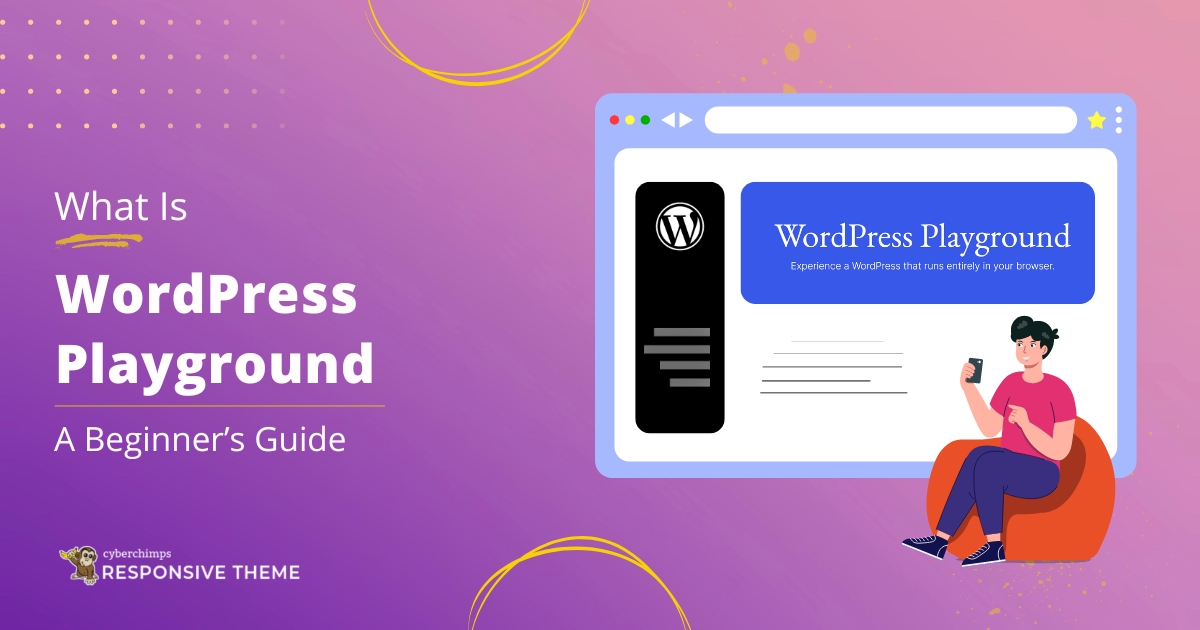Are you looking for the best eCommerce platforms of 2023?
Then worry not; here is a list of the best eCommerce platforms. These platforms make it simple for anyone to set up an online store and accept orders because of their attractive designs, user-friendly interfaces, and robust functionality.
We’ve collected the best eCommerce platforms, from Shopify to WooCommerce and beyond, to assist you in expanding your company and reaching new heights.
Be prepared to enhance your online store with these 15 cutting-edge eCommerce platforms!
What is an eCommerce Platform?
Online purchasing and selling of goods and services is known as eCommerce business. Selling their goods and services online has advantages for everyone, including freelancers and small and large organizations.
Retail, drop-shipping, digital goods, wholesale, services, subscriptions, crowdfunding, etc., are typical eCommerce examples.
The main goal of eCommerce is to simplify website management, sales promotion, and company operations for an online store. Recall the following four components of a good, safe eCommerce website.
Most modern eCommerce systems are SaaS (Software as a Service) applications that provide sophisticated cloud-based shopping features with pre-built marketing, content, and sales frameworks that interface effortlessly into existing workflows, which can benefit both B2B and B2C businesses.
Things to Consider When Choosing an eCommerce Platform
Here are some of the important factors you need to look out for:
1. Pricing and Payment
Pricing is among the most important things when choosing an e-commerce platform; many platforms provide various features at different prices. There is only one cheap flat charge on certain platforms and no additional transaction fees.
In others, to optimize your website, some platforms charge a base rate per transaction and may also demand subscriptions for other features. This can quickly pile up, so your final rate might be far higher with other platforms.
And how the platform handles online transactions is another thing to look out for. Giving your clients a variety of payment alternatives can enhance their purchasing experience, ultimately increasing conversions at your eCommerce site.
Examine the built-in payment gateways and see if you must spend extra to incorporate well-known processors. Having third-party payment options is crucial because they can make or break a deal.
When creating your pricing plan, check to see if there are any transaction costs to consider. It’s also critical to pay attention to whether the platform charges a percentage of sales if you exceed the sales cap of your contract.
2. Integrations
When evaluating eCommerce platforms, you should also consider their both integrations and plugins. Most platforms, like Shopify, will provide you with a wide range of tools to manage your business.
The plugins that would work best for you will depend on the requirements of your business. As you compare the various platforms, consider the tools you currently have or may require for your business.
Additionally, popular plugins often used include accounting, email marketing, payment and shopping cart, customer loyalty programs, etc.
3. Customer support
Customer service should be available around-the-clock, every day of the week, much like an online store. It is important to understand how an e-commerce platform responds to customer support inquiries under various conditions, such as irregular hours, specific online traffic problems, average waiting times, etc.
Your service plan may be closely related to the level of support you can get. For self-service support, larger platforms also offer FAQs and tutorials.
4. Security
When operating an e-commerce website, you must ensure that security standards are first-class. Information security is a duty that eCommerce companies owe to their customers. Making sure your e-commerce platform has PCI compliance, SSL, fraud protection, and data backups is one way to achieve this. Ensure that your e-commerce website is secure against cyberattacks and data theft from the start.
5. Speed & Scalability
While examining the performance and scalability of a platform is not easy, you can look at the areas that might be problematic, such as slow load times, frozen pages, 404 errors, and other poor performance indications. A key aspect of your evaluation should include analyzing the usual site performance and learning how many users the platform can handle at once during periods of high traffic.
We recommend looking for a cloud-hosted, scalable solution both with pre-built features and functionalities that will immediately meet the demands of your expanding business.
6. Core Features
There will be a variety of features available on different platforms. Some platforms provide integrated marketing tools like newsletters, abandoned cart emails, reward programs, daily discounts, etc., and basic eCommerce capabilities.
A platform for online shopping should also be able to replace any built-in features with app integrations, such as MailChimp or Shipstation. Although the built-in functionality can be good, using apps your team is accustomed to allows consistency, which can be essential for an expanding business.
Recommended: Check out tools to start your own business
Here is a comparison between the top five eCommerce platforms:
| eCommerce platform | Best for | Pricing | Payment Gateways | Additional Transaction Fees | Overall Rating |
| WooCommerce | Content-driven brands, small to medium stores. | Free (Hosting Not Included) | 100+ | None | 4.6/5 |
| BigCommerce | Private label B2C businesses, larger inventories. | $29.95-299.95/month | 55+ | None | 4.5/5 |
| Wix | Print on demand, small stores, boutiques, brick, and mortar. | $23 – $49/month | 35+ | 0 – 3% | 4.1/5 |
| Shopify | Drop shipping, print on demand, small stores, boutiques, brick, and mortar. | $29 – $299/month | 100+ | 0 – 2% | 4.2/5 |
| Sellfy | Businesses focusing on digital goods | $29-159/month | 50+ | None | 4.0/5 |
15 Top eCommerce Platforms to Consider
Let’s dive into the list of best eCommerce platforms:
1. WooCommerce
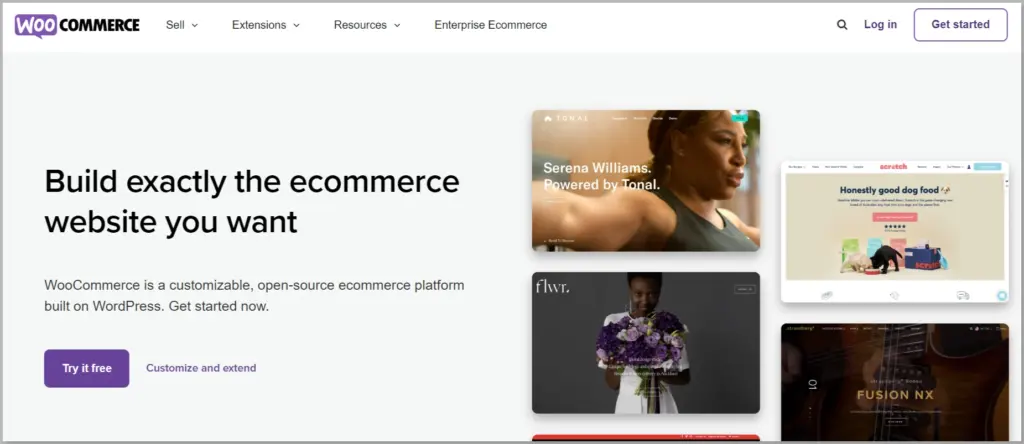
WooCommerce is an open-source eCommerce plugin for WordPress and an obvious choice for companies with an existing WordPress website because most modern websites are developed using WordPress.
Users can easily control the WooCommerce plugin from the WordPress dashboard once installed. WooCommerce is a fantastic option for both beginners and professionals due to its simplicity of setup and enhanced capability with hundreds of plugins.
WooCommerce has integrated SEO features, several payment channels, and options for multi-channel selling.
Features:
- With official extensions from the WooCommerce Marketplace, you can expand the functionality of your store by adding any available feature.
- There are many payment alternatives, including Stripe, PayPal, Square, Apple Pay, Google Pay, PayPal, and Amazon Pay.
- Help Google Analytics examine a store’s performance.
- Supports compliance standards, including GDPR and PCI DSS.
2. Shopify

In the field of eCommerce, Shopify is a world leader. With more than 2 million businesses already established, it is recognized by many store owners as one of the best all-in-one eCommerce solutions.
You can rapidly launch an online store using Shopify’s easy-to-use website builder. Both on Shopify’s platform and on external markets, there are many premium themes available.
Also, you can integrate apps from the Shopify app store for everything from shipping to order administration and marketing to design tools.
Features:
- You can sell your services or products on social media platforms like Facebook, YouTube, and Instagram.
- Provides templates for JSON, articles, carts, blogs, and collections in eCommerce.
- Provides Email and Push notification
- Many payment alternatives include PayPal, Meta Pay, Amazon Pay, Google Pay, and Apple Pay.
3. Adobe Commerce (formerly Magento)
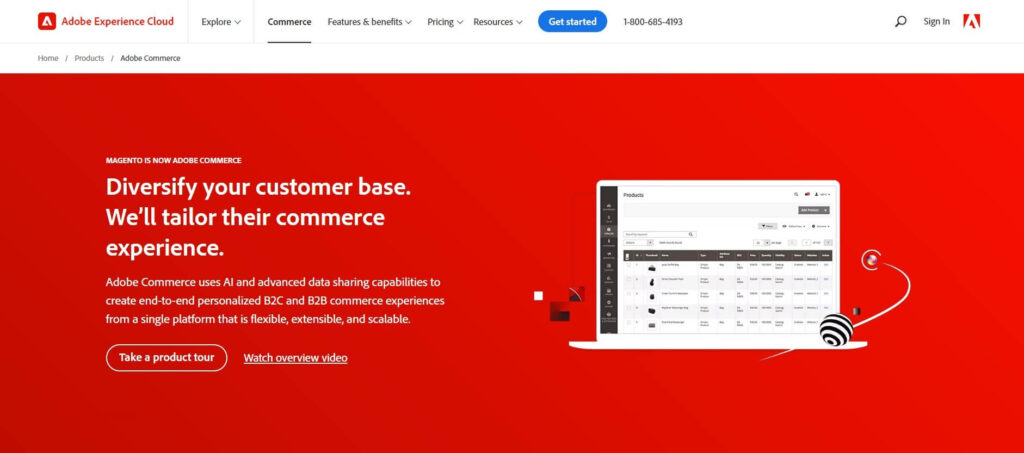
With both data reporting and consumer segmentation options, Adobe Commerce provides users with a robust page builder. To provide clients with customized shopping experiences and product recommendations, its features utilize both cutting-edge algorithms and AI (Artificial Intelligence) technology to evaluate customers’ activity.
Sales of digital products, including memberships, subscriptions, and services, are supported by Magento. Purchase additional features for your website using the Magento Marketplace, like themes, analytical tools, and payment options.
Despite the platform’s vast feature set, using Adobe Commerce requires a great deal of expensive maintenance and the assistance of specialized developers, making it challenging to estimate the total cost of ownership.
Features:
- Offers eCommerce templates for numerous platforms, including Templates Master, WeltPixel, Absolute, and Breeze Evolution.
- Provides support for compliance standards like PCI DSS.
- Several payment methods include debit and credit cards, PayPal, Venmo, and Apple Pay.
- Charges transaction fees of 3%.
4. Squarespace

Another well-known eCommerce platform is Squarespace. It offers eCommerce integration for all of its commercial plans, compared to certain other platforms.
It is preferred more by companies and people working in the creative industries. Their award-winning templates are ideal for singers, photographers, and fashion designers, and their designs are recognized as innovative and captivating.
Squarespace lets you both display and sell your art online. The platform can be used to market subscription services and digital content. Automatic inventory management, stunning product displays, and tools for calculating delivery costs are all provided by Squarespace for tangible goods. You can also display your product videos.
Features:
- It makes it easier for your website to stand out online by utilizing the templates created by the best designers.
- The expert portfolio designs available on Squarespace are excellent for showcasing your work.
- It uses advanced blogging features to publish news, product announcements, and stories.
5. Ecwid
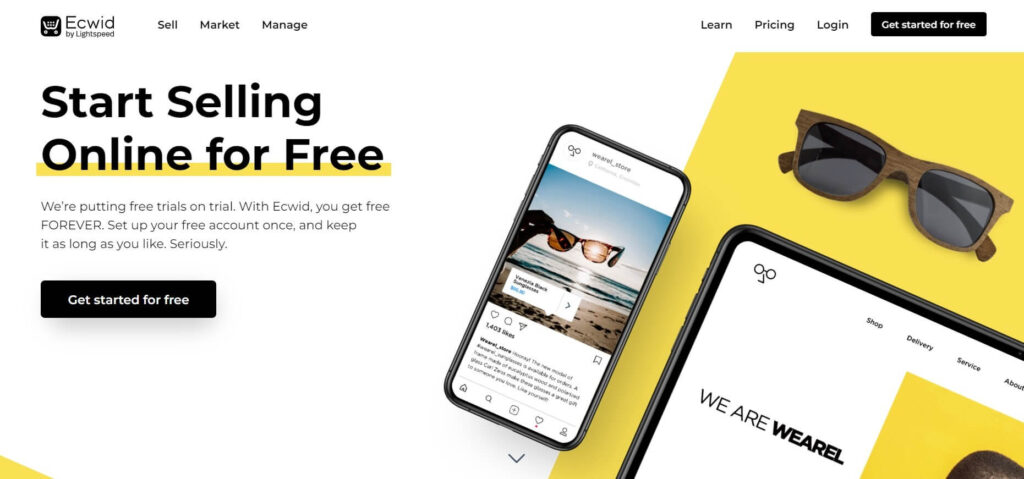
With Ecwid, you can utilize a flexible eCommerce platform to sell your goods and services anywhere. Ecwid is the answer for you if you want to create a multi-channel store for your business.
It enables you to manage all your sales channels from a powerful platform, whether you wish to sell on online markets like eBay or your website. You can use Ecwid’s themes to create your online store if you develop your website using them.
Although their website builder isn’t as feature-rich as others, you can easily create a website without writing code. You have access to many marketing options on Ecwid’s platform. You can provide promotional pricing, discount coupons, and bulk discounts without extra plugins or apps.
Features:
- Push notifications are available each time an order is placed, or payment is approved.
- Analyze a store’s performance using Google Ads, Google Analytics, and Universal Analytics.
- Admin, email, and push notifications are provided.
6. Wix
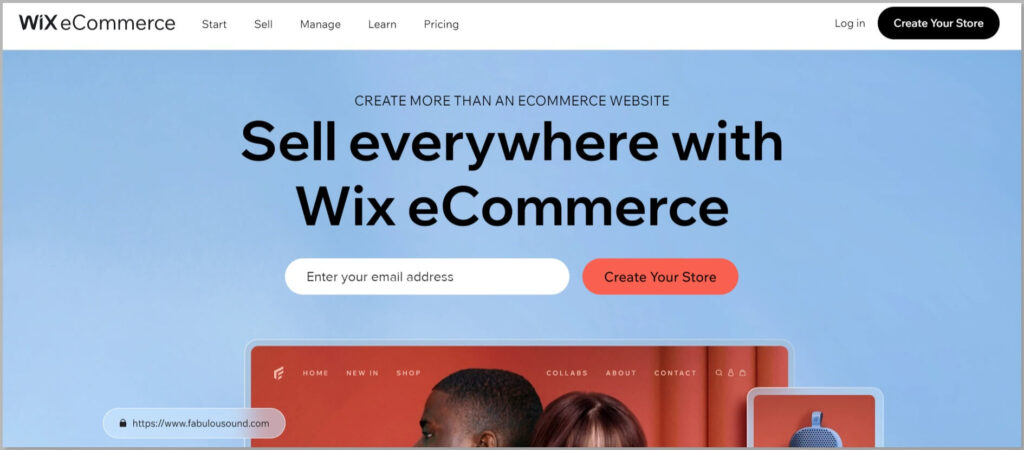
Wix is an extensive eCommerce platform with many features. To begin with, it includes a fantastic visual website builder that enables you to customize the look of your online store.
It offers a theme library with over 500 designer-made themes, each of which includes both some pre-designed and editable widgets and sections. You can add apps for design, marketing, and much more with just one click on your website.
Wix is serious about SEO, so you can both add and change the values for additional meta tags and update and establish custom URLs, meta titles, and descriptions.
Features:
- Provides tools for sending and managing invoices.
- You can utilize social media platforms like Facebook and Instagram to sell your products.
- Provides eCommerce templates for the following industries: fashion and clothing, jewelry and accessories, arts and crafts, home and decor, health and wellness, and food and beverages.
- Many payment methods are available, including iDEAL, Giropay, Apple Pay, and credit/debit cards.
7. Volusion
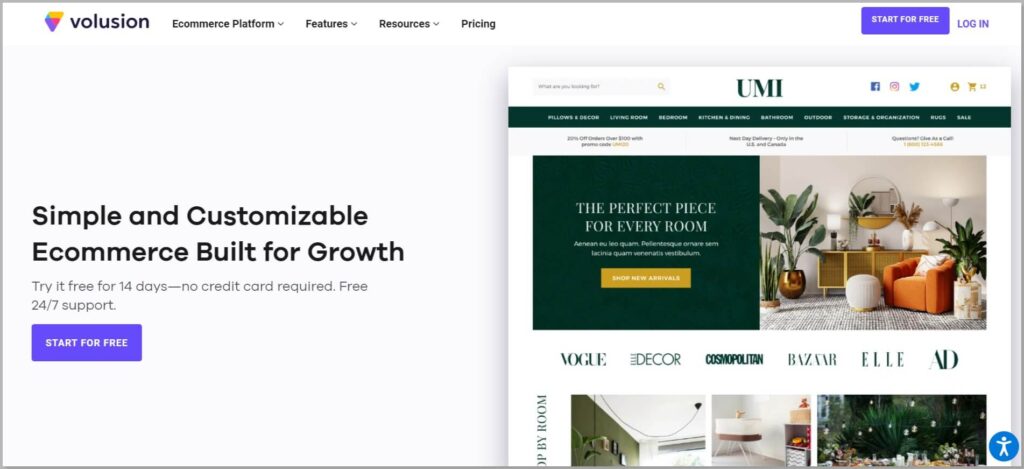
For people running dropshipping businesses, Volusion is a fantastic eCommerce platform. On Volusion, you can also launch a dropshipping company from scratch.
It offers over 80K dropshipping products and specializes in dropshipping tools that can be used to compare product prices. With the help of these tools, you can discover goods for dropshipping with higher profit margins.
This platform also enables you to sell digital products as software if you don’t want to sell tangible goods. Also, Volusion’s support staff is available via phone, email, and live chat around-the-clock if you require assistance.
Features:
- Volusion assures that they are PCI-compliant no matter the merchant’s plan.
- It has resources, including a barcode maker, inventory tracker, and store management app.
- To make your sites SEO-friendly, you can alter the meta descriptions, title tags, and URLs.
8. PrestaShop

PrestaShop is a well-known freemium open-source eCommerce platform with premium add-ons and plugins for additional functionality. PrestaShop can be downloaded for free, but a web hosting package must be purchased.
The PHP programming language and the MySQL database management system are used to create the open-source platform.
PrestaShop Experts is a special tool that links sellers to eCommerce experts worldwide to provide them with the support they need to run a successful online business.
Features:
- It enables you to publish your blog and content on all social media platforms to attract more visitors.
- Given that your business has no geographical boundaries, the PrestaShop platform enables you to set up an online store in various languages and currencies.
- You can choose from a variety of polished-looking themes when it comes to colors, logos, and designs.
- You can also manage orders, customer interactions, store products, and all the other statistics.
9. Sellfy
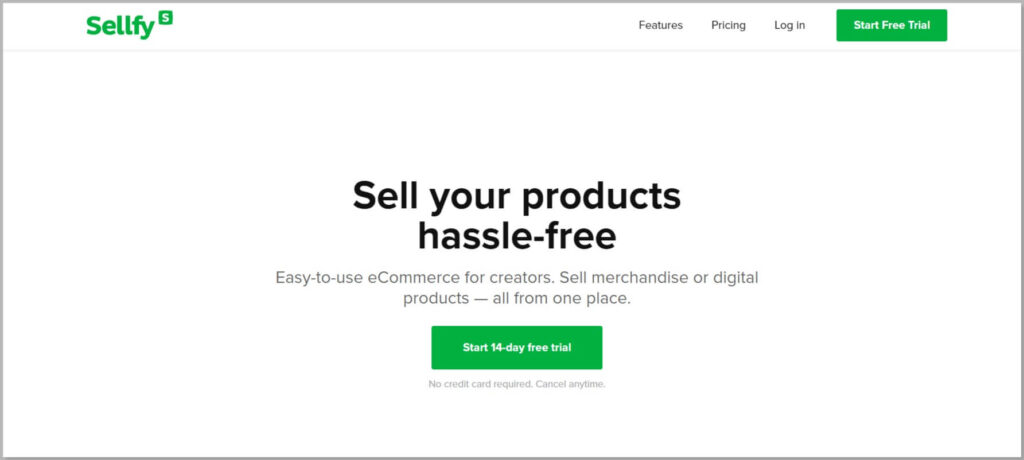
Sellfy began as an eCommerce site where you could only sell digital goods, but over time, they made many adjustments and added many features. You can now sell both physical and digital goods on your website. Small company owners can easily start an online store and sell their goods using this platform. It is also well-known among content creators, who use this eCommerce platform to market their goods.
On Sellfy, musicians, digital artists, and photographers can easily set up an online store to sell digital downloads. eBooks, movies, music, photos, and other digital files can be sold.
To get going, you must build an online store, personalize its look, link it to a custom domain, add products, add payment options, and start selling online.
Features:
- It allows you to sell your products and subscription.
- With Sellfy, creating an online store will take five minutes.
- It already has built-in marketing tools.
- You can use various payment gateways like Stripe and PayPal.
10. Patreon
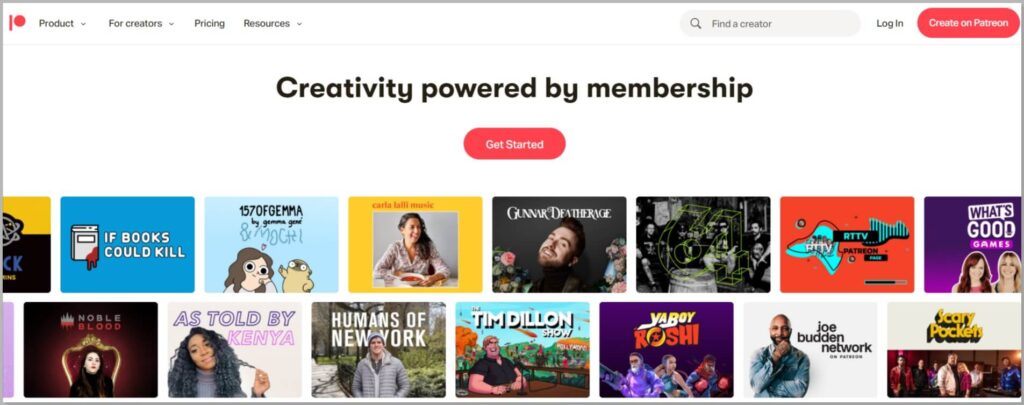
Patreon lets content creators charge their audience for access to their exclusive content. People who wish to start a membership-based business will love this. For instance, you can utilize Patreon if you run a podcast and wish to charge for access to special episodes or other content.
Customers can view your plans, subscribe, and gain access to your content on the platform’s built-in creator page, which you are given ownership of. It’s quite easy to develop content and grow your audience on Patreon, thanks to the dashboard’s simplicity.
You can produce and upload material through posts, live streams, videos, audio, and photographs. Patreon doesn’t have a monthly fee like the other platforms on our list; instead, they take a cut of your sales.
Features:
- Easy to set up unlimited recurring membership levels
- Create or upload your content with ease
- Create and manage promotions and limited-time offers
- Communicate directly with subscribers via email, posts, or direct message
- Track payments and analytics from the web or mobile app
11. Big Cartel
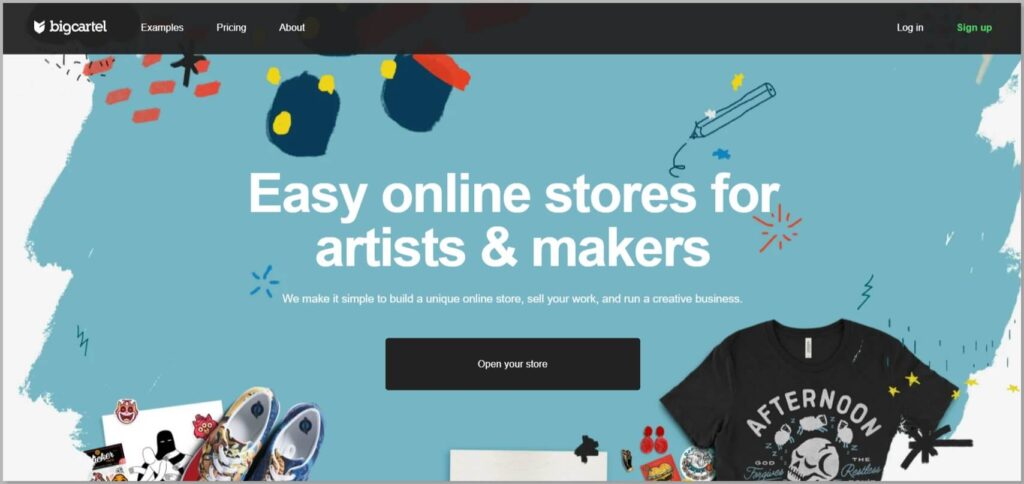
Big Cartel is an eCommerce platform designed with the needs of artists and creatives in mind. Although Big Cartel has a small collection of themes on our list, all of them are free.
And with a little CSS, you can customize their themes to personalize them. Big Cartel supports PayPal and Stripe payment processing.
Also, Big Cartel lacks an app store, making third-party integrations more difficult than on other platforms.
Features:
- It has a clean and uncomplicated dashboard.
- Easy order, product, and back office management.
- You can add custom code to the header for Google Analytics, Facebook Ads, etc.
- You can also add and edit theme CSS.
- With Big Cartel, you can create flexible, zone-based shipping rates.
12. BigCommerce
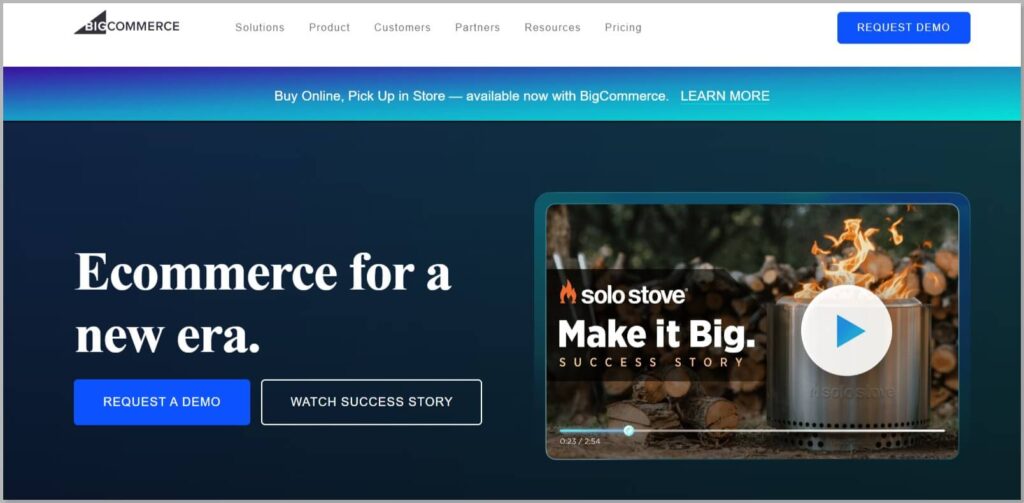
BigCommerce may be the right eCommerce solution for medium-sized to large organizations, such as B2B companies or distributors. BigCommerce is a SaaS eCommerce website builder that provides a full range of marketing tools, business statistics, premium design options, and a ton of assistance from pros in the field.
The channel manager feature for multi-channel selling is one of its outstanding features. With this feature, sellers can list products directly across Amazon, Google Shopping, Facebook, and many more channels using a single platform.
Also, the platform provides social media integration, robust SEO tools, and a built-in CDN for quicker site loading.
Features:
- It has a drag-and-drop page builder.
- You can upload and use custom page templates and themes.
- It has a script manager for custom code snippets.
- You can also personalize B2B and B2C sales with price lists.
13. OroCommerce
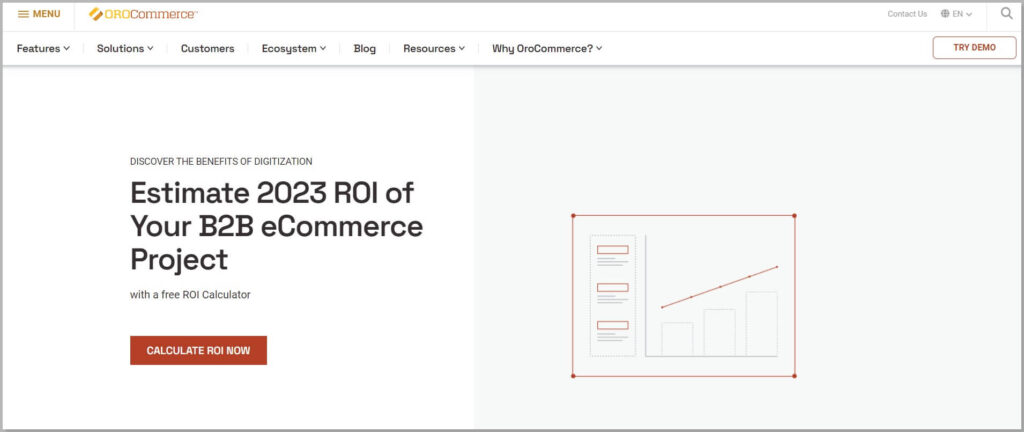
OroCommerce is the most popular platform for establishing a B2B eCommerce platform. It is an open-source B2B eCommerce platform with built-in CRM and third-party application integrations that is aimed at medium and large-sized companies.
This platform is built with premium features that are easily customizable to match the needs of transactions in the B2B and B2C sales sectors, enabling business flexibility.
Features:
- It is a B2B-focused eCommerce platform with a wide range of features.
- It has a built-in CRM for controlling and managing all business accounts.
- All the features are customizable to your personal needs.
14. 3dCart
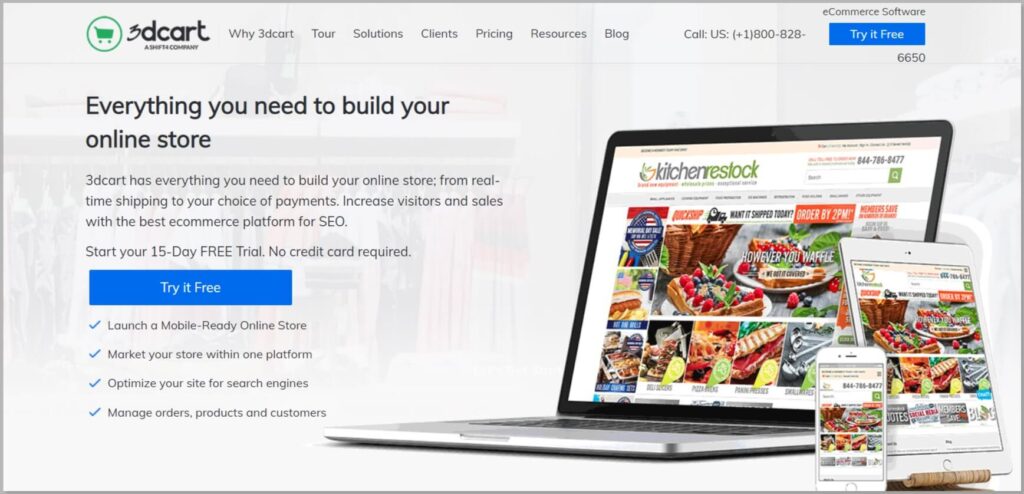
With the help of the eCommerce platform 3dcart, businesses can easily build and operate online storefronts, carry out online sales, accept payments, and deliver orders thanks to cloud-based functionality. With over 200 features already included, 3dcart is a comprehensive platform that supports drop-shipping and has capabilities for saving abandoned carts.
The fact that 3DCart is quite complex and is not suitable for everyone sets it apart from other eCommerce platforms. Like Wix, the platform doesn’t include a drag-and-drop builder. To fully personalize your templates and themes while utilizing the platform, you must be familiar with coding and web development services.
Installing 3DCart on your existing website will allow you to convert it into an eCommerce store. If you don’t know how to edit your website’s code, you’ll need to hire a developer to do it for you.
Features:
- It already has many premium features without requiring the most expensive pricing plan.
- Also enables fast order processing by printing single or many orders with one click, printing shipping labels, noting orders as delivered, and connecting with popular shipping providers.
- 3dcart has over 200+ features already included.
15. OpenCart
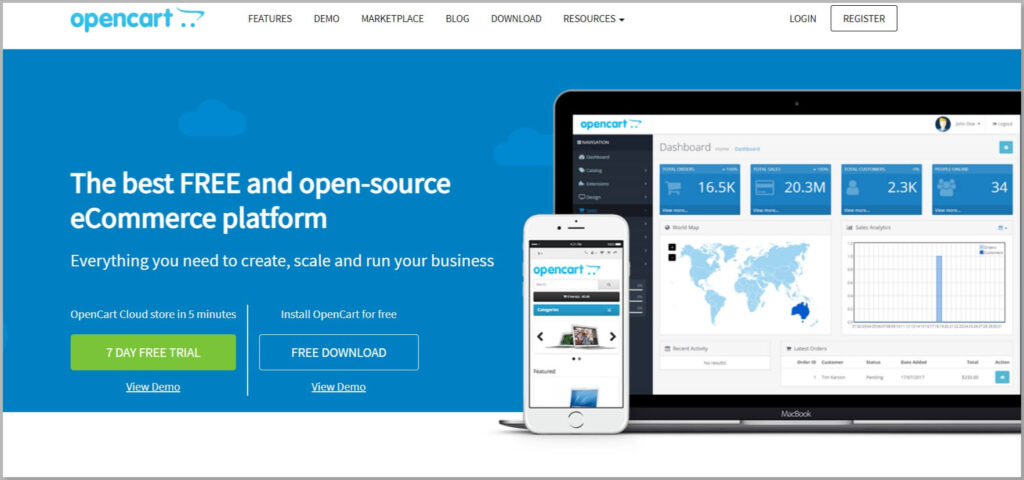
OpenCart is a self-hosted, open-source eCommerce platform with a ton of included features. It contains an easy-to-use dashboard that offers all the data required to monitor your store’s performance, including overall order volume and eCommerce sales metrics.
This eCommerce platform employs a module approach for customization. Although it is not as intuitive as drag-and-drop eCommerce website builders, it is still simple enough for beginners to design an online store quickly.
It already has a mobile-friendly theme, but you may find others compatible on third-party websites like Template Monster.
Features:
- It provides the biggest eCommerce selections of modules and themes to expand your store functionality.
- OpenCart offers a free online community and dedicated commercial support.
- Allows you to easily manage products, customers, orders, tax rules, coupon codes, and more.
- Sell your products on social media channels like Facebook, Whatsapp, Instagram, and more.
FAQs
It all depends on your industry; you can find an eCommerce platform that works well for your industry but not for others. You should consider the platform’s features, price range, and multi-channel selling capability to determine which eCommerce platform is appropriate for you. The top eCommerce systems, in our opinion, are Shopify, Wix, Squarespace, and BigCommerce.
Yes, you can use any of these platforms to launch a B2B eCommerce store and offer goods or services to companies. The greatest option for you to launch a B2B eCommerce store would be Shopify.
WooCommerce is the most affordable eCommerce platform because it is totally free. All you have to do to create your online store is install the WooCommerce plugin on a WordPress website.
Open-source and software as a service (SaaS) are the two most popular categories of eCommerce platform choices. Compared to the latter, an all-in-one solution, the former is frequently free and better suited for consumers seeking control and customizability.
Conclusion
Choosing the right platform can either make or destroy your online business in this fast-paced world of eCommerce. To assist you in achieving your goals, we have chosen the top 15 eCommerce platforms.
These platforms have all the resources you need for expanding your e-commerce business thanks to their innovative technology, intuitive interfaces, and robust functionality.
If you loved reading this article, check out some of the other articles too:
- eCommerce Metrics That Must be on Your Checklist
- Trendy Shoe eCommerce WordPress Themes
- How to Build An eCommerce Website With WordPress Step-By-Step Guide
Want to build an eCommerce website? Grab Responsive Theme today!




